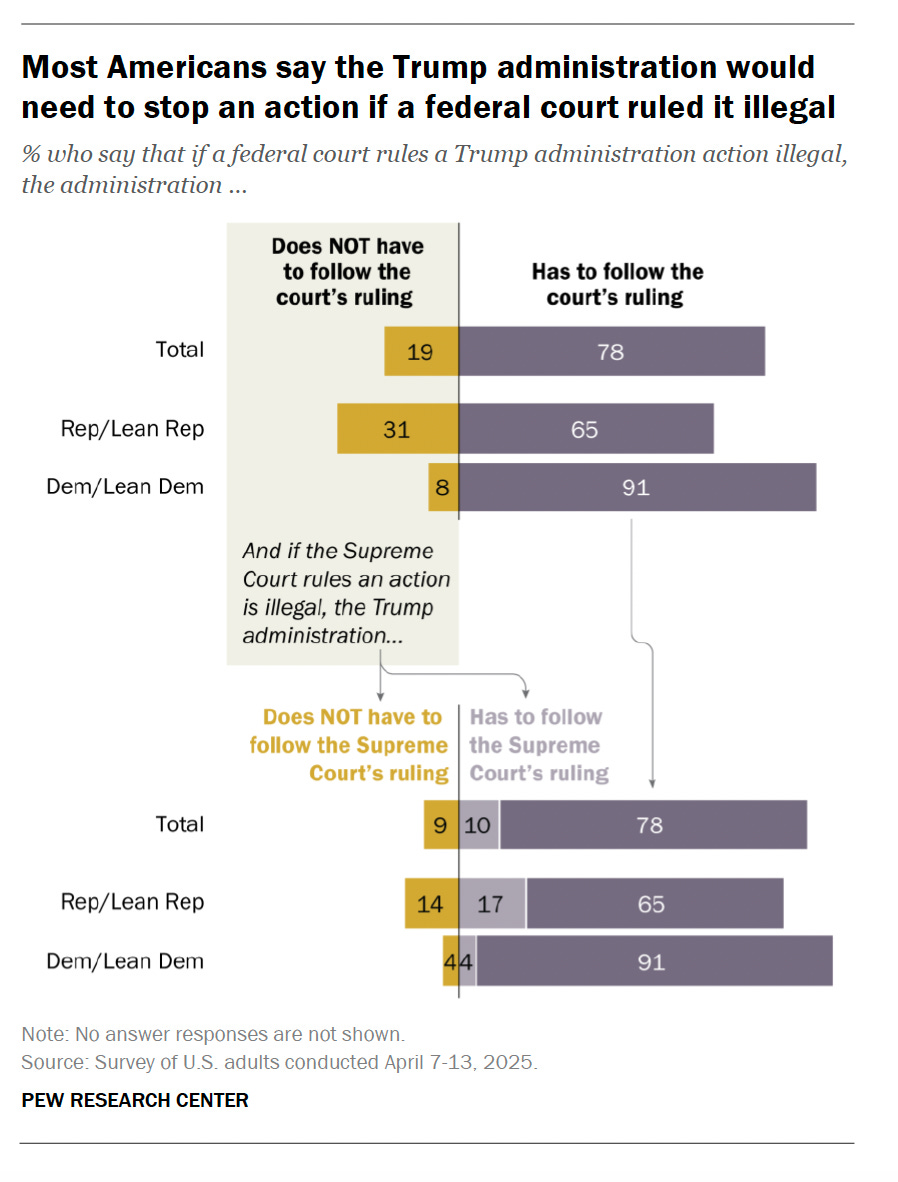Trump is threatening every one of us—including the Supreme Court

Among the many necessary skills Republicans on our Supreme Court lack is recognizing when they’re being threatened. But that may be changing.
During the Supreme Court Hearing Presidential Immunity Arguments in April of 2024, Justice Sonia Sotomayor asked Donald Trump’s attorneys:
“If the president decides that his rival is a corrupt person and he orders the military or orders someone to assassinate him, is that within his official acts for which he can get immunity?”
”It would depend on…” D. John Sauer, Trump’s then-lawyer, said. “We could see that could well be an official act.”
What if Trump decides a member of the Supreme Court is corrupt?
It was the most pointed question in the arguments of a case that will go down as one of the worst Supreme Court decisions in American history, alongside decisions such as Dred Scott, Korematsu, Bush v. Gore, Shelby v. Holder, and Dobbs.
(FYI: It was Sauer’s preposterous arguments that set Marcy Wheeler on the path of producing Ball of Thread in hopes of saving this country from fascism. That didn’t work out. At least, not yet.)
I only wish Justice Sotomayor had asked, “If the president decides that a member of the Supreme Court is a corrupt person and he orders the military or orders someone to assassinate him, is that within his official acts for which he can get immunity?”
The Court didn’t, as far as my non-lawyer brain can tell, say that Trump could just go ahead and drone strike Joe Biden or John Roberts or Bruce Springsteen and have it be an official act.
Instead, they said, “Maybe!”
That’s where we are. We have a president who calls anyone who doesn’t bend to him or even praise him “corrupt.” And he may have the power to assassinate any one of us—including former presidents and current members of the Supreme Court—if he feels like it.
All thanks to a 6-3 decision delivered by all the Republicans on the Court.
Cut to May of 2025
D. John Sauer is now Trump’s Solicitor General.
It’s just over 100 days into the new Trump regime, and the Supreme Court is already hearing a preposterous attack on birthright citizenship, which aims to erase nearly a century and a half of jurisprudence and every bit of common sense.
During these arguments, Justice Amy Coney Barrett is valiantly attempting to persuade Sauer to acknowledge that the Trump administration will adhere to circuit court rulings.
“Generally.”
That was about the best Sauer would do given several chances.
Where Barrett went next was highly revealing. If it were a scene in a movie, it would indicate that the character had a sudden realization that she and everyone she had ever trusted had made a horrible error that could cost her everything.
Elura Nanos at Law and Crime explains:
Barrett opted to bring the Supreme Court itself, and its history, into the discussion. The justice asked Sauer whether he accepted a “Cooper v. Aaron situation” for the Supreme Court, but not for the circuit courts. Barrett’s reference was to the unanimous 1958 Supreme Court ruling that denied Little Rock, Arkansas, the right to delay school desegregation after the ruling in Brown v. Board of Education. The precedent stands for the concept that states are bound by and must enforce the Supreme Court’s decisions even when they disagree with them.
She asked the question about “Cooper” once and then felt the need to clarify very specifically:
In other words, you would respect the opinions and the judgments of the Supreme Court, and you're saying you would respect the judgment but not necessarily the opinion of a lower court.
Sauer served a word salad that ended with the notion that following circuit court rulings “has not been a categorical practice in the way respect for the precedence and the judgments that the Supreme Court has been.”
Barrett again felt the need to clarify. “So you're not hedging at all with respect to the precedent of this Court?” she asked.
“That is correct. I -- I believe the --”
“All right,” she said and moved on.
Amy Coney Barrett is no hero
I’d caution anyone, including myself, from reading too much into anything Amy Coney Barrett says or does.
She’s a rank Justice whose only distinction is occasionally not being as rank as her fellow Trump-appointees, Neil Gorsuch and Brett Kavanaugh, and a step above the abject horrors of Clarence Thomas, Samuel Alito, and John Roberts.
But MAGA understood that her willingness to stand up for court decisions inherently makes her an enemy of their monarchical movement.
After this exchange, the filthiest filth of the movement called her a “DEI hire”. They savaged the woman who gave conservatives what they had dreamed of for half a century—the end of Roe v. Wade.
The Justices should be scared
The need to confirm that the Trump regime would follow court orders revealed an anxiety that should be pulsing through every one of us.
Two Fridays ago, Stephen Miller—the “untouchable” architect of Trump’s authoritarian fantasies, as Superlawyer Marc Elias of Democracy Docket, called him—took a planted question from a Gateway Pundit “reporter” about when (not if) Trump will throw out habeas corpus. Habeas corpus, as we’ve all been forced to remind ourselves, is the right that makes all the other rights possible by allowing citizens to challenge an unlawful detention.
You obviously don’t want to give Donald Trump the power to wipe away your most central right whenever he feels like it. In the episode of NEXT COMES WHAT above, Andrea Pitzer draws on her global history of concentration camps to explain why:
I’d like to suggest another reason the executive branch wants to suspend habeas corpus: to be able to detain its opponents indefinitely without having to justify its actions. But I don’t even have to be right about the president’s current intentions with regard to habeas corpus for it to be a threat. All you have to do is ask yourself whether, if Trump were given this power with regard to immigrants but would suddenly also find himself permitted to arrest anyone he wanted—including the journalists he has repeatedly called “enemies of the people”—would he stop at the detention and arrest of only immigrants?
The episode also explains how, when dictators successfully quell this Universe-given right, the crises that unfold can last a decade or more. Something every American needs to understand so we can avoid such a crisis of our own.
“Absolute Immunity” made this all possible
There were impeccable legal arguments against granting Trump broad power to disregard the Constitution in the course of “official acts.” The DC Circuit laid them out in its unanimous ruling against Trump’s blanket immunity claims.
But Trump’s inability or unwillingness to stop himself was the most compelling practical argument against giving him or anyone that kind of power he now inhabits, thanks to the Republicans on the Supreme Court.
And he will, if he can, eventually use it against anyone he perceives as being in his way, including the Republicans on the Supreme Court.
And even John Roberts seems to be getting it
The worst Chief Justice in American history has felt compelled twice in this short second Trump regime to defend the integrity of the courts. He has twice vaguely and without ever using Trump’s name defended the integrity of the judges in our court system and specifically rejected the calls from Trump and MAGA to remove jurists who render rulings they don’t like.
“Impeachment is not an appropriate response to disagreement concerning a judicial decision,” is as pointed as he got.
As Joyce Vance noted:
The Supreme Court should not be seen as meddling in politics, but there are moments that demand a response out of Court, and Roberts has come to the defense of his fellow judges. It’s a shame he hasn’t always done the same thing for democracy from inside of the courtroom.
We must do what the courts refused to do
Because of the Court’s “absolute immunity” decision, Trump never faced a court trial for his actions on January 6th. Because of that decision, he rightly feels emboldened in ways he did not in his first regime.
Since Frankenstein, literature and film have been replete with narratives about mad scientists who recognize that the monster they created will eventually come for them.
The conservative movement, with its fantasies of unchecked Republican executive power, made Trump inevitable. A court created to unleash this sort of monster is unlikely to be the one to restrain him. But it will still be good if Roberts and Barrett try when the time comes.
Ultimately, the answer keeps coming back to us, the people, to save this country. Polls show that we aren’t just rejecting this regime and the fuckery it used to slip into office but that we—overwhelmingly—reject the idea that Trump can throw out fundamental rights and ignore decisions from the courts. Even Republicans want Trump to bow to the Supreme Court.

But Trump didn’t get in this to bow to anyone, except Emirs who give him free planes.
The slow realizations of Amy Coney Barrett and John Roberts are vital because they offer insights into how to wake up this self-preservation instinct in the millions of Americans who will need to stand up at a key moment to tell Trump that he’s done. And their lead may even help let many Americans who would typically not take to the streets know that it’s time to stand up.
But we can’t forget: No one is more complicit in Trump’s run at dictatorship than Barrett or Roberts. And I don’t count on them ever to be the leaders that we need.
Yet they are canaries in this coal mine. And they are coughing away. If they get it, anyone can.
THE FARCE is a reader-backed publication that fights fascism with fearlessness. Subscribe to fuel the fight—free or paid, your support matters. You can always drop us a tip.

Member discussion